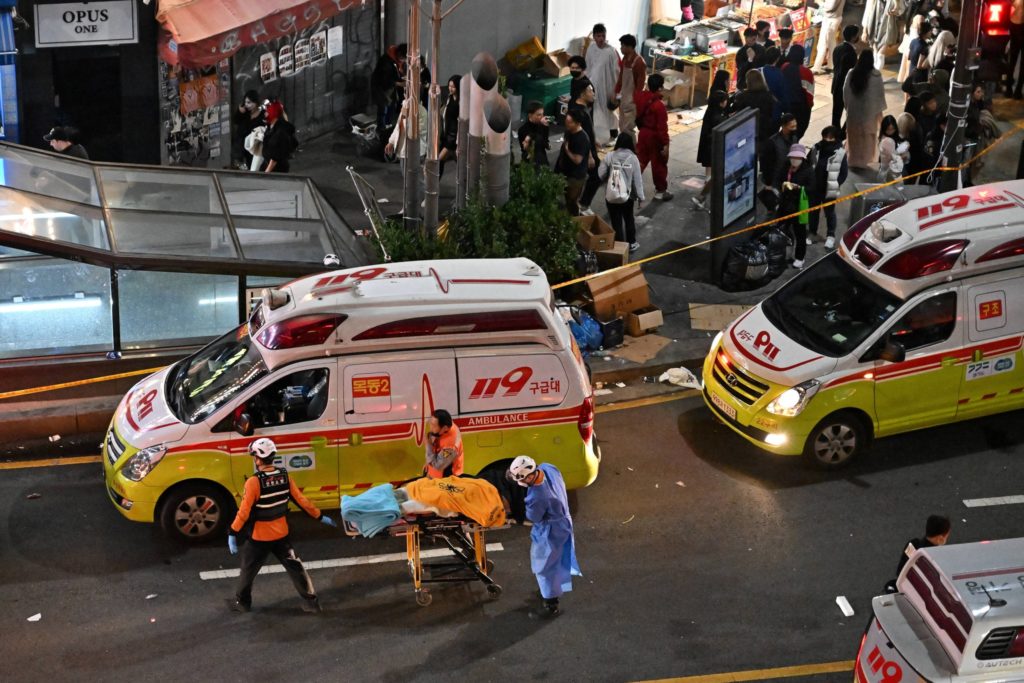
The body of a victim of cardiac arrest is transported in the popular nightlife district of Itaewon in Seoul on October 30, 2022. – Dozens of people suffered from cardiac arrest in the South Korean capital Seoul, after thousands of people crowded into narrow streets in the city’s Itaewon neighbourhood to celebrate Halloween, local officials said. (Photo by Jung Yeon-je / AFP)
SEOUL — More than 150 people, mostly young costumed partygoers in their teens and 20s, were killed in a crowd surge and stampede at a Halloween event in Seoul’s popular Itaewon nightlife district.
It is the worst-ever stampede in South Korea’s history and President Yoon Suk-yeol has ordered a full investigation and vowed such a tragedy will never be allowed to happen again.
Here’s what we know:
What happened?
Up to 100,000 people descended on Seoul’s popular Itaewon district Saturday night for the first Halloween event without COVID-19 restrictions in three years.
Local merchants who have worked in the area for 30 years told AFP that the crowd had been “unprecedentedly large” this year but an earlier statement from the police indicated they only planned to deploy 200 officers.
Videos posted on social media showed the packed but initially peaceful crowd starting to panic as people kept pushing into a narrow, downhill alleyway, which was already wall-to-wall with revelers.
“People couldn’t move forward and were pushing and pushing, and it was a steep hill so people were falling on top of each other, collapsing on top of each other,” eyewitness Jarmil Taylor, 40, told AFP.
“People that were at the back were pushing and pushing because they had no idea what was going on in the front.”
How did people die?
The majority of the victims were young women in their 20s, officials said, who died due to being trapped in the tightly-packed crowd in the narrow, sloping alleyway at the heart of the disaster.
In most stampede situations, experts say, people die of suffocation, and authorities in Seoul initially said that many victims were suffering cardiac arrest, which is the ultimate cause of death in such circumstances.
Eye-witnesses also described seeing people falling and getting trapped by the crowd before being trampled and crushed.
A delay in emergency first aid could also have led to more deaths, critics said, pointing to a lack of police at the scene which meant first responders initially struggled to reach victims through overcrowded alleyways.
This delay was critical as many victims who suffered cardiac arrests may have passed the crucial “four-minute” window before help arrived, experts said.
Where were the police?
On the other side of town, the interior minister said: a huge protest in Seoul’s Gwanghwamun district Saturday also required a significant police presence, so many officers were deployed there.
In documents posted two days before the event, the police said they only planned to have 200 officers present for the Itaewon Halloween event.
Critics said this displayed a woeful lack of planning.
“This is a man-made disaster prompted by a lack of awareness about safety,” said Shin Dong-min, a professor at the Korea National University of Transportation.
“Itaewon vendors and government officials should have had more preparations about a massive crowd gathering,” he told YTN news.
And the rescue?
As a short-handed relief team struggled to assist scores of victims in cardiac arrest, passers-by jumped into help with first aid efforts and to perform CPR.
A video that circulated on Twitter showed dozens of people coming to perform CPR on victims sprawled in the street; other footage showed people in costumes carrying limp bodies on their backs.
“I was walking by but stopped to help with CPR because it looked like an emergency situation,” Min Byung-yeon, a former nurse, told YTN.
Another woman who had gone to Itaewon with her child to enjoy the festivities said she was asked to perform mouth to mouth resuscitation on a handful of victims.
But others said people were too preoccupied with their phones to assist.
“I couldn’t hold back my tears as no one offered to help but continued to film,” as she performed CPR, one woman who identified herself as a nurse wrote on Twitter.
South Korea’s tech companies including Kakao Talk, and Twitter Korea, have urged users to refrain from sharing graphic images of the disaster.
Why did it happen?
President Yoon has declared a period of national mourning and vowed to “thoroughly investigate the cause of the incident”.
In the absence of an immediate official explanation, rumors have exploded online.
Some users have speculated the stampede could have been triggered by a gas leak or a fire at one of the clubs, others claim the cause could have been a celebrity sighting.
Online users also floated the possible use of drugs, with photos of purported “drug candies” allegedly handed out at the event circulating on Twitter.
Police have so far found no evidence of any of this, and eye-witnesses did not describe anything along these lines to AFP.
Experts, instead, point to policing and crowd control failures.
RELATED STORIES
South Korea’s Yoon declares mourning period after Halloween crush kills 151
At least 149 killed in stampede at Halloween event in South Korea